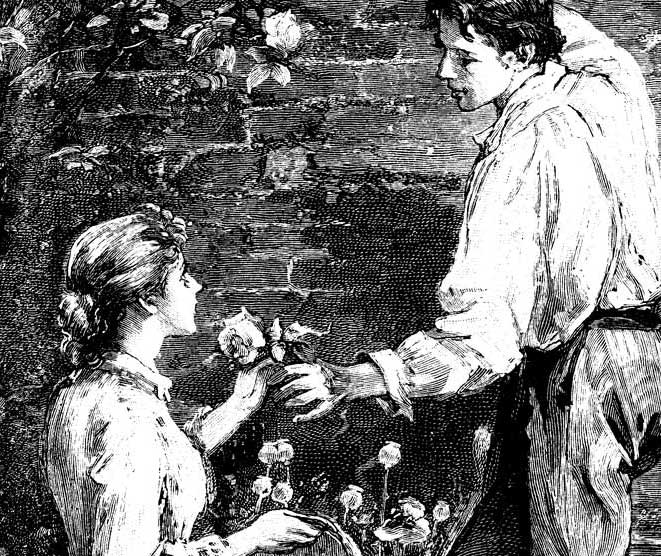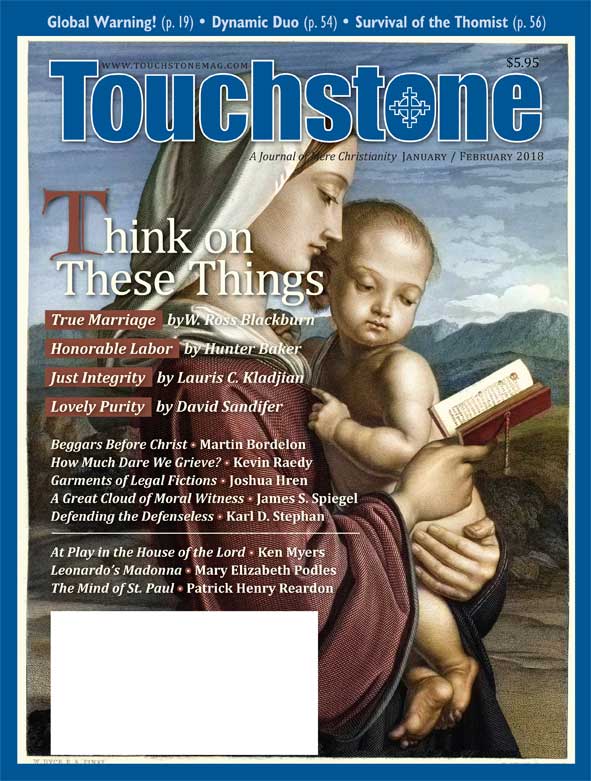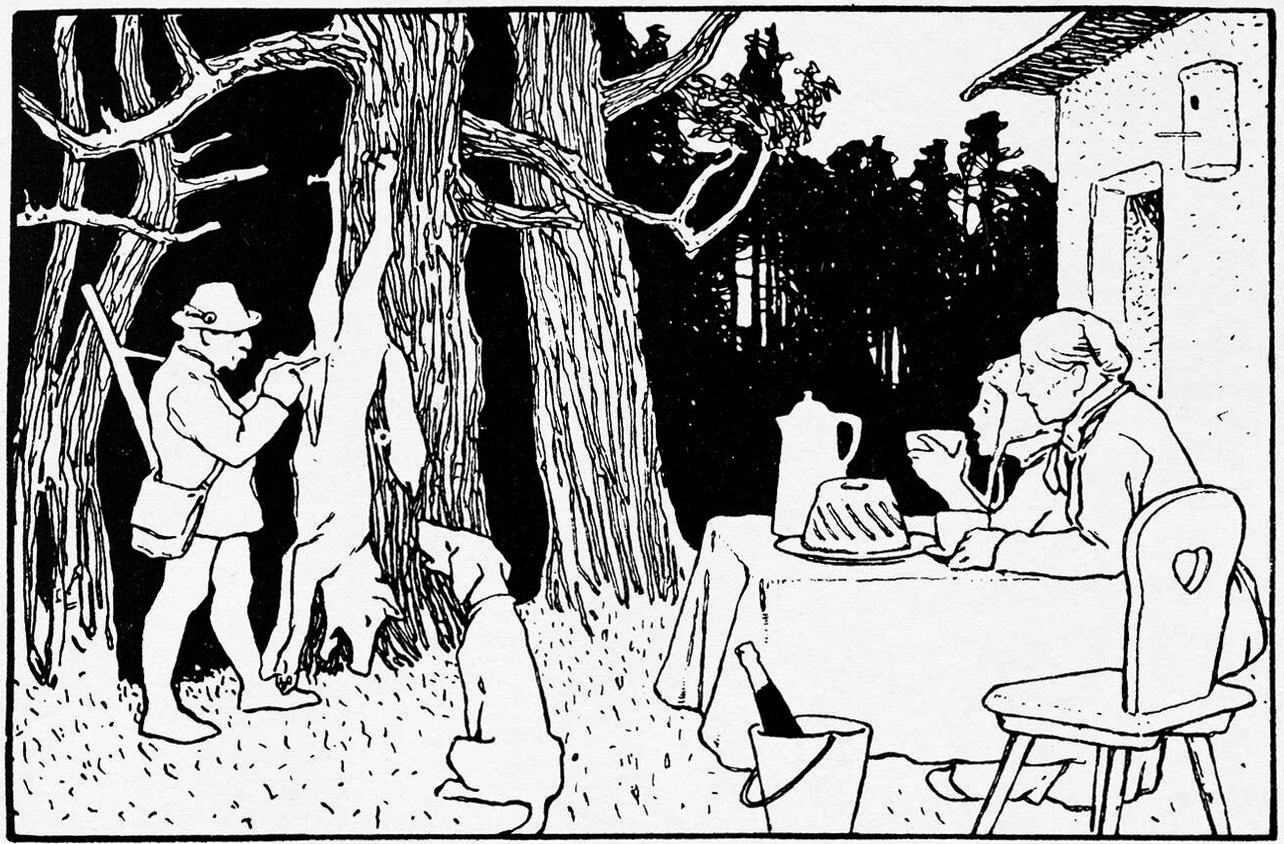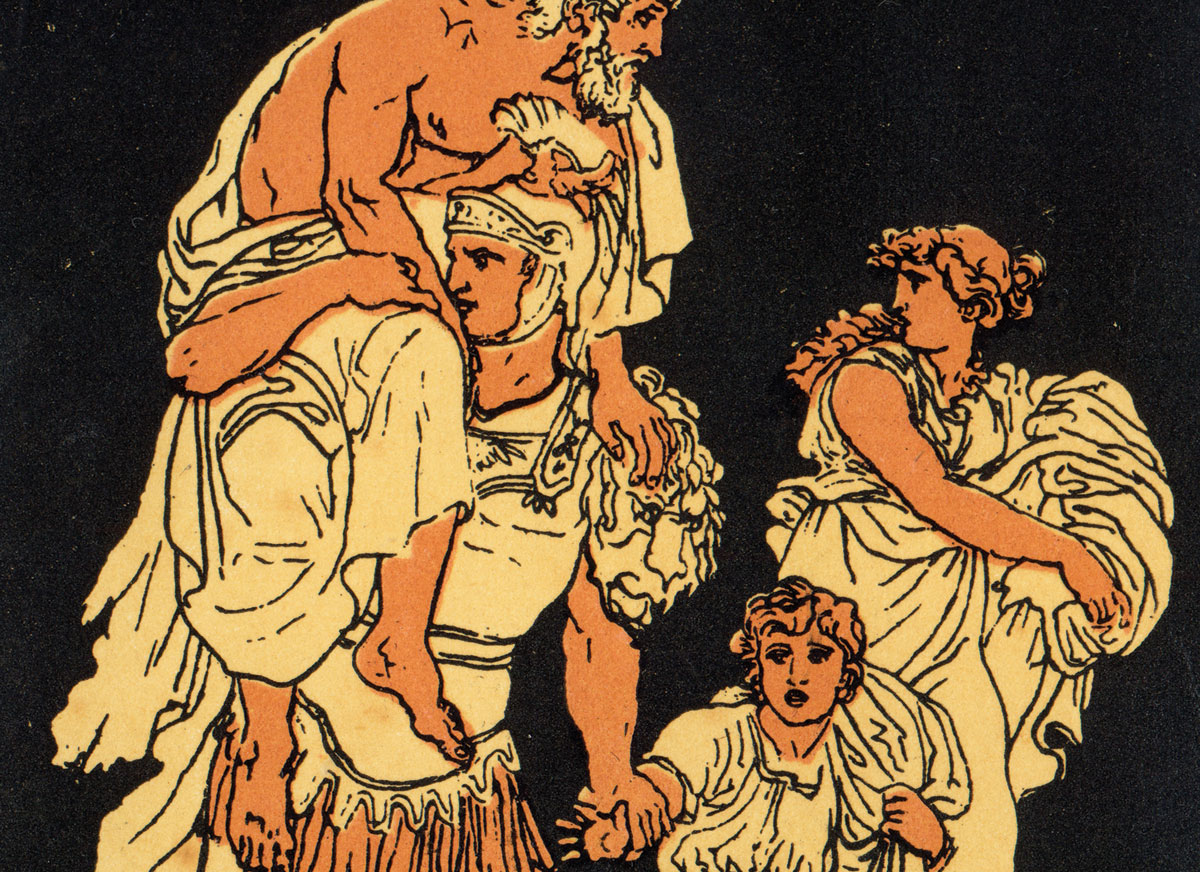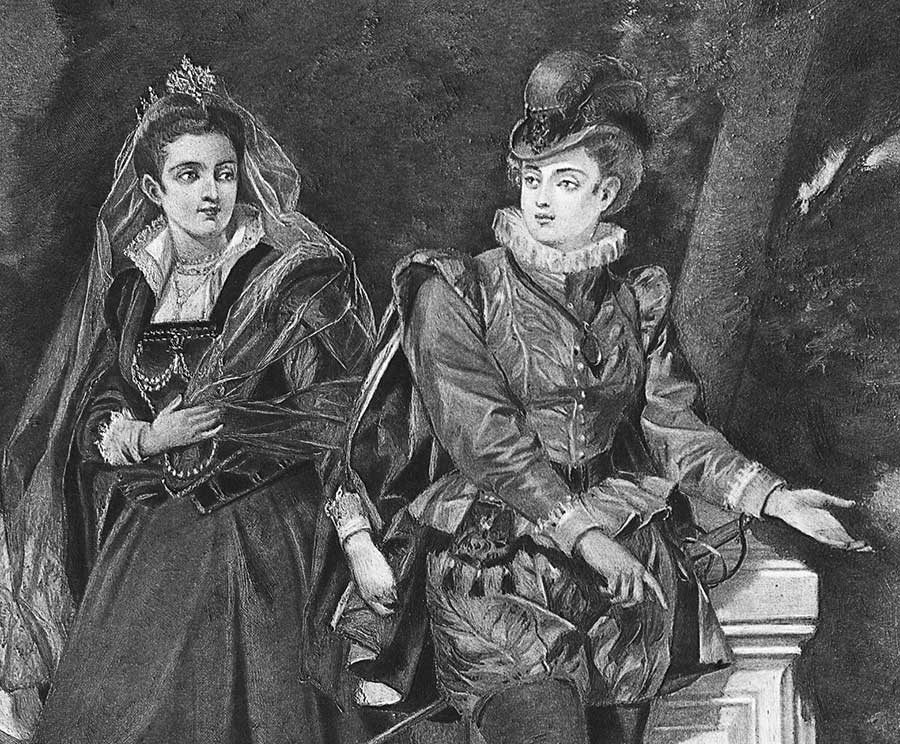Feature
In Defense of Prudery
The Wisdom of the Victorian Quest for Innocence by David Sandifer
In 1818, Dr. Thomas Bowdler published his landmark Family Shakespeare, the subtitle of which announced that "those words and expressions are omitted which cannot with propriety be read aloud in a family." By mid-century it was the best-selling edition of the bard. In the typical Victorian home, this (or one of its even more severely excised competitors) was the edition that would have been found on the library shelf.
Bowdlerism is one of many manifestations of that most stereotypical of all Victorian qualities: its famed "prudery." And while the Victorians themselves have been largely rehabilitated from the ridicule that they were subject to in the popular imagination for much of the twentieth century, the reason for that ridicule has not; their increased respectability has been achieved (perversely) at the expense of downplaying their sexual conservatism in favor of highlighting the variability and paradoxes of Victorian culture.
But that conservatism itself, especially with respect to public morals, remains an embarrassment—the word "bowdlerism," after all, is only ever used pejoratively. Indeed, Victorian conservatism continues to be seen as an awkward detour in the grand liberal project of emancipation, which otherwise seems to flow uninterrupted from the Enlightenment forward. Yet the Victorian quest for innocence in fact reflects something much more profound: the flowering of a deeply Christian vision of sexuality into broad cultural norms. In a society bent on normalizing perversion and marginalizing purity, it is a vision that twenty-first-century Christians would do well to study.
The Ethic of Innocence
While no piano legs were ever modestly draped in nineteenth-century Britain, it is no caricature to say that concerns for a purified public space were central to Victorian morality. In fact, one may justly speak of an "ethic of innocence" as one of the defining aspects of the culture of the period. It was not just the popularity of bowdlerized works that marked a shift in the early part of the century. The theater simultaneously became more chaste and declined in popularity, as even the purified version became less creditable. Novels adopted a more upright tone—best epitomized in the works of Sir Walter Scott and, especially, Jane Austen—characteristic of a genre of "religious-didactic fiction" popular during the period. The upper classes no longer flaunted their excesses, and the lower classes, in their quest for respectability and under the growing influence of Methodism, moderated their coarseness and lewdness. An entire culture of bawdy satirical prints, which had thrived in the late eighteenth century, had disappeared by the 1820s.
It was a transformation that was noted with amazement by many at the time. The tailor and social reformer Francis Place meticulously documented the changes that had taken place in one generation among the working classes, noting, for example, that the lewd songs that were commonly sung in his youth "have all disappeared and are altogether unknown." At the other end of the social spectrum, Sir Walter Scott's great-aunt expressed her astonishment when she re-opened a novel she had enjoyed in her youth: "I found it impossible to get through . . . but is it not odd that I, an old woman of eighty and upwards, sitting alone, feel myself ashamed to read a book which sixty years ago I have heard read aloud for large circles consisting of the first and most creditable society in London?"
While historians continue to argue over what caused these changes, it is clear that they didn't emerge out of nowhere. Societies for the reformation of manners had existed since the late seventeenth century, attempting with various degrees of success to bring about moral reform. The eighteenth century had seen the rise of a "culture of sensibility," expressed in the likes of Samuel Johnson, which sought to soften and refine the mores of the middle and upper classes. Most significantly, the Evangelical Revival—the British expression of the Great Awakening—had acted as a spiritual leaven throughout British society, eventually reaching its most elevated stations by the late eighteenth century. William Wilberforce famously identified a "reformation of manners" as one of the "two great objects" that God had set before him, but he was not alone; multiple historical forces served to catalyze pre-existing beliefs into a growing consensus for the need for a purified public space.
Three Pivotal Beliefs
Among these beliefs, three in particular stand out. In the first place, the Victorians inherited a view of human nature that saw moral traits as radically plastic. This meant that every book, every play, every conversation, indeed, every aspect of one's environment, was viewed as contributing either positively or negatively toward the development of one's character. While Locke had famously referred to this in terms of a "blank slate," a more frequently used image to describe this pervasive dynamic was that of the garden: it will grow either weeds or flowers, depending entirely on what is sown—and it will not grow nothing. "Culture" (it is easy to forget the derivation of the word) thus consists in implanting the right sorts of things and in keeping the wrong sorts away.
Media in particular were viewed as having a decisive effect in shaping individuals and society, with Thomas Carlyle going so far as to argue that the influence of books and periodicals exceeded that of the pulpit, and likening their authors to a "priesthood." The controversy in the first part of the century over the poems of Lord Byron, virtually incomprehensible to modern readers, must be understood in this light: he was not viewed merely as morally reprehensible, but as truly dangerous—one journal accused him of flinging "firebrands in sport," while Thomas Macaulay asserted that he had corrupted a whole generation with a defective ethical system.
Second, the arts were viewed as existing first and foremost for moral improvement. This was not a matter of making art mercenary; our contemporary assumption that aesthetics and morality are independent realms—a view that gained ascendancy with the Aesthetic movement of the 1870s—would have been unfathomable to most people in the early nineteenth century. Like Plato (who taught that poets should be compelled to speak only moral truth), or Milton (who believed that only the good man could be a good poet—that he must be a "true poem" to write well), or Samuel Johnson (who affirmed that in novels "the best examples only should be exhibited"), or even Diderot (who believed that only moral art would last), most assumed that art which tended to corrupt was simply bad art.
A striking instance of this is found in the justification given for bowdlerization: it was often stressed that the work was aesthetically improved by the removal of its objectionable elements. Thus the pre-eminent journal of the period, the Edinburgh Review, described Bowdler's excisions as removing "not so much cankers in the flowers as weeds which have grown up by their side." As a result, Shakespeare's works appeared "more natural and harmonious without them."
Finally, Victorian society increasingly came to venerate marriage and family, an attitude that had been characteristic of Evangelicals since the Evangelical Revival. Marriage was conceived as the greatest good of earthly life, out of which flowed all manner of other goods, both for individuals and society. It was the key both to personal happiness and to societal order and progress. Thus, for example, the blessings of the nuclear family were given central place in the tracts of the Evangelical uber-reformer Hannah More, and home and hearth were conceived of as the center of a properly ordered life, and the joys of domestic peace as an antidote to seductive worldly pleasure.
Marriage was thus both a source of moral and spiritual energy, and a prophylactic against temptation. It followed from this that anything that undermined marriage was felt to be supremely dangerous, and so sexual immorality was singled out as especially pernicious. For Harriet Bowdler (sister of Thomas, and a reformer in her own right), seduction was a sin worse than murder, since "those who kill the body have no more that they can do," whereas the seducer would rob his victim of her virtue as well as "perhaps her eternal happiness."
Not Worth Knowing
Taken together, it is not hard to see how these beliefs would have resulted in an attitude of vigilance toward potentially corrupting influences. There was an obvious practical dimension to this, and one that applied disproportionately to women, as any reader of Jane Austen will know: a young woman of good standing who fell into an illicit relationship was likely to see her future options dramatically and irretrievably curtailed. But there was also something much more profound going on—after all, it is unlikely that anyone believed that reading Shakespeare's double-entendres would in itself make a girl ripe for seduction.
Instead, representations of sexuality that were coarse or that sanctioned immorality were seen not only to weaken resistance to vice, but also to sully the soul, to desensitize the conscience, and, ultimately, to dehumanize—debasing sex by divorcing it from its properly elevated context. Herein lay the justification for keeping certain sins hidden as much as possible, since the mere knowledge of them altered the moral landscape for the worse. When Lord Desart objected to a proposed provision in Parliament against lesbian acts, he expressed his objection in characteristically Victorian terms, even if the year was 1921: "You are going to tell the whole world that there is such an offence, to bring it to the notice of women who have never heard of it, never thought of it, never dreamt of it. I think this is a very great mischief."
Nor was the sense of loss from exposure to sexual sin limited to women. The mid-century novelist Charles Kingsley presents his love-struck protagonist reflecting on his earlier indiscretions in these terms: "How gladly . . . he would have welcomed centuries of a material hell, to escape from the more awful spiritual hell within him—to buy back that pearl of innocence which he had cast recklessly to be trampled under the feet of his own swinish passions!"
In fact, one of the most fruitful ways of framing the changing norms of public morality in nineteenth-century Britain is as a kind of feminization of society: the standards that had earlier been applied most forcefully to women came increasingly to be directed toward men as well. Thus Hannah More's extraordinarily popular tracts at the turn of the century may be read as a struggle to vanquish the bawdy and undisciplined masculine culture of the tavern with the order and tranquillity of domestic life. Revealingly, this was precisely the way that the rise of a purified tone was viewed by its detractors: William Thackeray lamented the fact that even satire had become "gentle and harmless, smitten into shame by the pure presence of our women and the sweet confiding smiles of our children," and Algernon Swinburne pined for a poetry that would not be "fit for the sole diet of girls."
Seen in this light, the censuring of sexual content for the purpose of protecting moral innocence was neither priggishness nor hypocrisy. The absurd characterization of Victorians as "anti-sex" profoundly misunderstands their attitude. Not only did such influential writers as Kingsley and Coventry Patmore (of The Angel in the House fame) extol the raptures of wedded love, but sterner moralists such as Harriet Bowdler likewise paid tribute to the chaste joys of marriage, albeit in more veiled language: "it is the glory of the Christian religion that, while it checks every approach to vice . . . it bids us to perform for [God's] sake, all those kind offices which even natural affection would lead us to perform for our own."
Fundamentally Binary
A moving record of this vision was provided by a recent oral history of early twentieth-century sexuality, Sex Before the Sexual Revolution,based on interviews with elderly Britons. While their attitudes were not uniform, one of the key findings of the study was that many of the interviewees prized the innocence and privacy that were characteristic of their own experience. The authors, Simon Szreter and Kate Fisher, observed that the respondents found the initiation into sex in marriage "joyous and exciting," not "despite their 'inhibited' and private culture, but, rather, because of it." In fact, for many of them, this was the reason they accepted to be interviewed: in spite of believing that sex ought to be private, they were willing to discuss it because of their concerns for contemporary society. As one respondent put it: "it's made dirty today . . . it's a private thing and it's not a dirty thing like they make it out; it's not!" This brings to mind the observation of German philosopher Max Scheler that, far from being inimical to sexual love, modesty is a prerequisite for it, creating a protected space that allows the fusion of the physical with the relational: full sexual pleasure is impossible without it.
Victorian public morality was indeed implacably, ferociously, pro-chastity. But undergirding this was a view of sexuality as fundamentally binary: it was necessarily either a very great good (in marriage) or a very great evil (in any other context). Dietrich von Hildebrand offered a vivid description of this dichotomous vision of sex:
Sex only possesses the tender, mysterious, ineffably uniting and intimate quality when exercised as the expression of something more ultimate—namely, wedded love. . . . Sex is always extraordinary, but its characteristic extraordinariness assumes diametrically opposite forms. At one time it is awe-inspiring, mysterious, noble, chaste, and free; at another, illegitimate, intoxicating and befogging. . . . An entire world divides the extraordinariness of miracle from the twilight of magic, sinister and devilish. . . . So it is, mutatis mutandis, with sex.
This attitude, of course, is not prudery. It recoils only from illicit sex, not sex itself. But in a cultural environment that acknowledges no such distinctions, it is not surprising it should be made to wear the label.
Learning from the Victorians
Contemporary Christians—especially, perhaps, conservative Christians—are often uneasy with their historical association with a more severe and moralistic kind of religion. Reacting perhaps to past excesses (and, for some of us, to our own upbringings), we are keen to emphasize our freedom in Christ when it comes to secondary matters. Many of us are also sensitive to being typed as conventional or traditionalist when we believe that the gospel is fundamentally radical and disruptive. Furthermore, we want to focus our attention on the reality of redemptive grace, and the fact that no sin is beyond the transforming reach of the Cross. Perhaps for these reasons, we are uncomfortable placing too much stress on the question of what Christians should read and watch.
The example of our Victorian forebears should give us pause, however. They lived in a world where media were both much less pervasive and much less perverse, and yet they were deeply aware of their own vulnerability to corruptive influences. We may not share their Lockean psychology, nor, in our post-Freudian world, ever be able to quite see sexuality as the discreet thing they did; we may feel that their squeamishness was excessive, and we may prefer our Shakespeare unmolested. Yet they offer us a bracing reminder of the truth that the battle for sexual purity begins in the mind. It was not they, but Paul, who enjoined us to be "innocent of evil" (Rom. 16:19) and to think on "whatever is pure, whatever is lovely" (Phil. 4:8). It was not they, but our Lord, who commanded us to pluck out the eye that offends (Matt. 5:29).
Today we face both the privilege and the challenge of navigating a world with virtually unlimited options for the media, which are available for us to consume. One lesson we can learn from nineteenth-century Christians is that the choices we make in this area are far from trivial. The standard they often employed in judging a play or a book was whether or not it was "improving," recalling Paul's injunction that "all things are lawful, but not all things build up" (1 Cor. 10:23). Adopting this principle for our lives would mean approaching our choices for media consumption as something like curators: each of us is charged by God with the delicate and vital task of determining which words and images ought to fill the collection which is our mind.
In a society that has abandoned any claim of being Christian, it is perhaps no longer appropriate for us to engage in an all-out effort to purify the public space. Surely, however, we should be seeking to purify our private ones.
David Sandifer teaches ethics and practical theology at Tyndale Theological Seminary in Amsterdam. His Ph.D. (Cambridge, 2014) looked at concerns about the protection of moral innocence in early nineteenth-century Britain. Previously, he served as a pastor in the U.S. and Australia, and he co-founded Porn Harms Kids in Australia (later echildhood.org).
subscription options
Order
Print/Online Subscription

Get six issues (one year) of Touchstone PLUS full online access including pdf downloads for only $39.95. That's only $3.34 per month!
Order
Online Only
Subscription

Get a one-year full-access subscription to the Touchstone online archives for only $19.95. That's only $1.66 per month!
bulk subscriptions
Order Touchstone subscriptions in bulk and save $10 per sub! Each subscription includes 6 issues of Touchstone plus full online access to touchstonemag.com—including archives, videos, and pdf downloads of recent issues for only $29.95 each! Great for churches or study groups.
Transactions will be processed on a secure server.
more on family from the online archives
more from the online archives
calling all readers
Please Donate
"There are magazines worth reading but few worth saving . . . Touchstone is just such a magazine."
—Alice von Hildebrand
"Here we do not concede one square millimeter of territory to falsehood, folly, contemporary sentimentality, or fashion. We speak the truth, and let God be our judge. . . . Touchstone is the one committedly Christian conservative journal."
—Anthony Esolen, Touchstone senior editor





